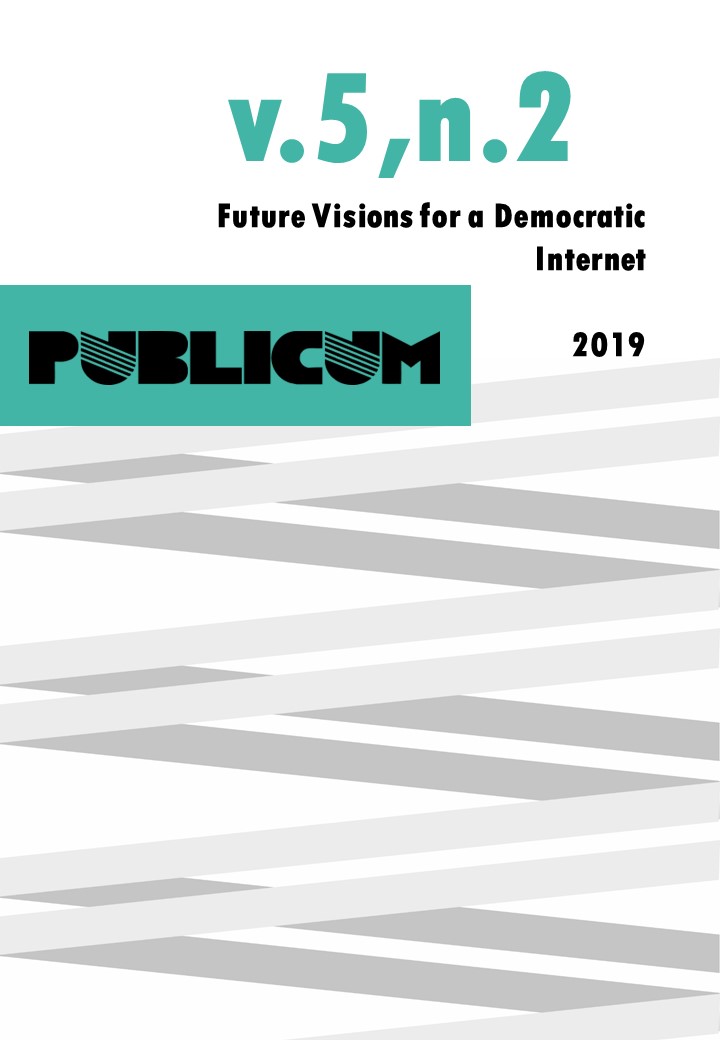Constitution, democracy, regulation of the internet and electoral fake news in Brazilian elections | Constituição, democracia, regulação da internet e fake news nas eleições brasileiras
DOI:
https://doi.org/10.12957/publicum.2019.47211Palavras-chave:
Constitution, democracy, regulation of internet, fake news, Brazilian elections. | Constituição, democracia, regulação da internet, Eleições brasileiras..Resumo
Abstract: In the last general election held in Brazil, Laura Chinchilla, a representative of the Organization of American States (OAS) observer mission, considered the massive use of fake news through social networks, notably WhatsApp, an "unprecedented" phenomenon. The phrase registers a state of novelty and, at the same time, uncertainty in the legal and social scenario of the Brazilian democracy, which since 1996 has strongly invested in the computerization of the electoral process and has specifically regulated the phenomenon of Internet use in the electoral process. Thus, a great question arises about the role that the advances of the digital world, more specifically the Internet and social networks, can play in defining the democratic agenda, especially when they place on the one hand democratic legitimacy and respect for human rights and on the other the extent of economic and social power (including its abuse) enhanced by individuals and groups through new digital technologies. In this way, this work seeks to analyze the legal frameworks for the use of the Internet in the Brazilian elections and how the existing normativity responds to the fake news phenomenon and its implications for the full realization of constitutional democracy. In order to do so, the paper proposes a comparison between the existing legislation in Brazil on electoral use of the Internet and its appropriation and effectiveness (or absence thereof) in decisions of the Brazilian electoral courts, including the Superior Electoral Court, seeking to understand how the established dialogue between norms and judicial decisions reflects more or less effectiveness of the existing regulation for the use of the Internet and social networks in the elections, delimiting if the degree of effectiveness presented accomplishes or frustrates the constitutional bases of democracy in Brazil.
Resumo: Nas últimas eleições gerais realizadas no Brasil, Laura Chinchilla, representante da missão de observação da Organização dos Estados Americanos (OEA), considerou o uso massivo de notícias falsas (fake news) por meio de redes sociais, notadamente o WhatsApp, um fenômeno "sem precedentes". A declaração registra um estado de novidade e, ao mesmo tempo, incerteza no cenário jurídico e social da democracia brasileira, que desde 1996 investe fortemente na informatização do processo eleitoral e regulou especificamente o fenômeno do uso da Internet no mundo. Assim, surge uma grande questão sobre o papel que os avanços do mundo digital, mais especificamente a Internet e as redes sociais, podem desempenhar na definição da agenda democrática, especialmente quando colocam, por um lado, a legitimidade democrática e o respeito aos direitos humanos e, por outro, a extensão do poder econômico e social decorrente da internet e das redes sociais (incluindo a possibilidade de seu abuso) por indivíduos e grupos. Dessa forma, este trabalho busca analisar os marcos legais para o uso da Internet nas eleições brasileiras e como a normatividade existente responde ao fenômeno das notícias falsas (fake news) e suas implicações para a plena realização da democracia constitucional. Para tanto, o artigo propõe uma comparação entre a legislação existente no Brasil sobre uso eleitoral da Internet e sua apropriação e efetividade (ou ausência dela) nas decisões dos tribunais eleitorais brasileiros, incluindo o Tribunal Superior Eleitoral, buscando entender como o diálogo estabelecido entre normas e decisões judiciais reflete mais ou menos efetividade da regulamentação existente para o uso da Internet e redes sociais nas eleições, delimitando se o grau de efetividade apresentado realiza ou frustra as bases constitucionais da democracia no Brasil.
Downloads
Publicado
Como Citar
Edição
Seção
Licença
O autor do trabalho declara conhecer e concordar com as regras a seguir:
1) Realizou o trabalho apresentado à revista, sendo inteiramente responsável pelas ideias e conceitos nele emitidos, que não correspondem, necessariamente, ao ponto de vista dos Editores de Publicum.
2) Obedeceu, na realização do trabalho, os princípios éticos aludidos na política de avaliação da revista[RDN1] .
3) Assume a autoria e a responsabilidade pela obra, declarando que ela não infringe quaisquer direitos de propriedade intelectual de terceiros.
4) Responsabiliza-se, integralmente, por danos de natureza moral ou patrimonial que a veiculação da obra venha a gerar a terceiros.
5) Cede à revista os direitos de reprodução, edição e primeira publicação do trabalho em qualquer meio midiático, em particular sob forma digital, em arquivo eletrônico online na internet.
6) Confere aos Editores o direito de modificar o texto apresentado, sem prejuízo de seu conteúdo, quando necessário para uniformizar a apresentação dos trabalhos e para atender as normas de edição próprias da revista.
7) Concorda com a forma final do trabalho aprovada pela revista.
8) Autoriza a divulgação do trabalho nos canais de comunicação da Faculdade de Direito da UERJ.
9) Concorda com a reprodução de pequenos trechos do trabalho em outras publicações da UERJ.
10) Reconhece que, pela cessão e autorizações acima referidas, não receberá remuneração sob qualquer modalidade, tendo estas o caráter de colaboração científica.
11) Tem ciência de que a publicação do trabalho poderá ser recusada caso não considerada conveniente, por qualquer motivo que seja, sendo que tal recusa não gera responsabilidade e/ou ônus de espécie alguma à revista ou UERJ.
[RDN1]Ver COPE.

Publicum está licenciado com uma Licença Creative Commons Atribuição-NãoComercial 4.0 Internacional.

